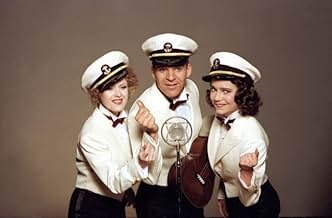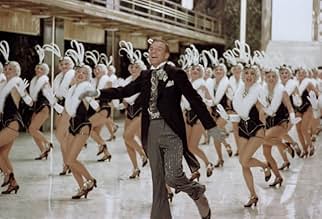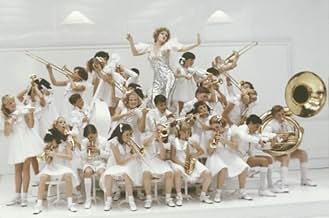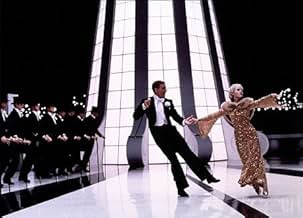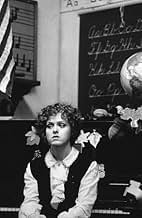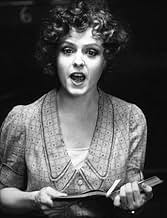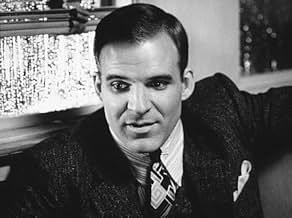IMDb-BEWERTUNG
6,5/10
6559
IHRE BEWERTUNG
Füge eine Handlung in deiner Sprache hinzuDuring the Great Depression, a sheet-music salesman seeks to escape his dreary life through popular music and a love affair with an innocent schoolteacher.During the Great Depression, a sheet-music salesman seeks to escape his dreary life through popular music and a love affair with an innocent schoolteacher.During the Great Depression, a sheet-music salesman seeks to escape his dreary life through popular music and a love affair with an innocent schoolteacher.
- Für 3 Oscars nominiert
- 3 Gewinne & 9 Nominierungen insgesamt
Francis X. McCarthy
- The Bartender
- (as Frank McCarthy)
Shirley Kirkes Mar
- Tart
- (as Shirley Kirkes)
Empfohlene Bewertungen
When Herb Ross opened "Pennies From Heaven" during Christmas of 1981 it met with harsh press and public indifference. Many concluded the musical was dead.
But "Pennies," like Bob Fosse's "All That Jazz" released two years before, is a key transitional work that juxtaposed the cynicism of the '70s to the exhilaration and escapist fantasy of its buoyant Depression era score.
Steve Martin ran the risk of alienating his fan base by trading in the "Wild and Crazy" guy for the brooding, unfaithful Arthur Parker. But he's a revelation. And what a dancer!
It was no surprise when audiences stayed away.
By all means watch it today, particularly on the new widescreen DVD release. You'll walk away with a greater appreciation of Christopher Walken, Bernadette Peters and especially Steve Martin.
It makes it so much harder to watch this major talent wasting himself in such tripe as "Cheaper by the Dozen" and "Bringing Down the House."
But "Pennies," like Bob Fosse's "All That Jazz" released two years before, is a key transitional work that juxtaposed the cynicism of the '70s to the exhilaration and escapist fantasy of its buoyant Depression era score.
Steve Martin ran the risk of alienating his fan base by trading in the "Wild and Crazy" guy for the brooding, unfaithful Arthur Parker. But he's a revelation. And what a dancer!
It was no surprise when audiences stayed away.
By all means watch it today, particularly on the new widescreen DVD release. You'll walk away with a greater appreciation of Christopher Walken, Bernadette Peters and especially Steve Martin.
It makes it so much harder to watch this major talent wasting himself in such tripe as "Cheaper by the Dozen" and "Bringing Down the House."
If you are truly interested in seeing this film, please read the review written by Pauline Kael, who with her unique voice, says everything I am about to try to say, perfectly. This may not be a movie for everybody. First, you may have to have some patience for musicals. And secondly, you may have to have patience for complex people and their problems. I have watched this movie with two friends, and the first yawned everytime the actors opened their mouths to lip sync the beautiful and strange Depression era songs. The second found the role played by Steve Martin heartbreaking, and could not watch the entire film. But I think this movie can be extremely rewarding, and have found myself watching it a least once a year for the past few years. I think the Depression makes an excellent back round in this bittersweet story of blind optimism, and this movie greatly inspires my imagination. I imagine the whole U.S. as it was in the early part of the century, filled with millions of dreamers, greedy for sex and love and money, just like people are now, only now most people have a shot at a least one of those things, and during the depression, beautiful and hopelessly empty dreams were everywhere, as poverty crushed lives right and left. Steve Martin and Bernadette Peters are as connected and magical together as they are in the Jerk. In fact, everything I love about The Jerk is what I love about Pennies From Heaven. Some of the musical sequences are breathtaking, particularly a dance number performed by Christopher Walken ! And the subtle beauty of the last song sung by Steve Martin, I don't know how to describe it. In closing, this movie is not for everybody. But I know I am not the only person out there who will see this movie as the unique gift that it is. Please give it a shot.
This film has so many good things in it and so much talent worked so very hard on it that it's just baffling to me that so much of it doesn't work. I love '30s and '40s musicals, and I saw this film in 1981, and I've seen it about 10 times more on DVD. I like a lot of it, but somehow it's just not a very good movie, and I still can't figure out why.
The music is good. The musical numbers are creatively shot and well-executed; the Walken number alone took weeks to film. The sets, costumes, photography, and color are beautiful and give the film a real Depression feel. Clearly, no expense was spared. The actors give it their all. The re-creations of photos and paintings (including "Nighthawks" which is actually from WW2) are breathtaking. They must have been very hard to set up, light, and shoot. But, in keeping with the film's low-key style, they're not lingered on at all, and if you look away you can miss them.
Is the problem Steve Martin? This choice caused some controversy in 1981. He lacked film experience and he might not have been the ideal choice, although it's hard to guess what other leading man could have done that vaudeville stuff in 1981. Martin, at least, doesn't obviously fall down on the job; the verdict is still out. But Peters, who even apart from this film seems to belong to the '30s, holds up her end of things.
Maybe it's the script and the way the film is conceived. If the idea is to realize what these '30s drudges fantasize about-- and to do it in a '30s-musical style, as if they imagine themselves the heroes of musicals-- then there has to be something to the drudges that makes us care what they fantasize about. But there isn't enough to these people. They're drawn as thin types; yet the material is played very slowly, as if they were supposed to turn into real people at some point. They never do, and so by the end it all peters out (no pun intended). I also thought the subplot with the young girl was a maudlin absurdity, right out of a Mary Pickford tear-jerker.
Perhaps the real problem can be traced back to the origins of the project. It plays almost like an English musical made in an American style, and it doesn't work very well. The humor in the book is too tedious, too black, and too obsessed with tit jokes to be American. And the musical numbers are too slick, loud, and overproduced to be English. The filmmakers couldn't find a way to make these two parts fit together. And so they are just jammed together over and over again. One is constantly aware of the bad fit. It just doesn't come together, but in the various parts there are still more than enough reasons to see it.
The music is good. The musical numbers are creatively shot and well-executed; the Walken number alone took weeks to film. The sets, costumes, photography, and color are beautiful and give the film a real Depression feel. Clearly, no expense was spared. The actors give it their all. The re-creations of photos and paintings (including "Nighthawks" which is actually from WW2) are breathtaking. They must have been very hard to set up, light, and shoot. But, in keeping with the film's low-key style, they're not lingered on at all, and if you look away you can miss them.
Is the problem Steve Martin? This choice caused some controversy in 1981. He lacked film experience and he might not have been the ideal choice, although it's hard to guess what other leading man could have done that vaudeville stuff in 1981. Martin, at least, doesn't obviously fall down on the job; the verdict is still out. But Peters, who even apart from this film seems to belong to the '30s, holds up her end of things.
Maybe it's the script and the way the film is conceived. If the idea is to realize what these '30s drudges fantasize about-- and to do it in a '30s-musical style, as if they imagine themselves the heroes of musicals-- then there has to be something to the drudges that makes us care what they fantasize about. But there isn't enough to these people. They're drawn as thin types; yet the material is played very slowly, as if they were supposed to turn into real people at some point. They never do, and so by the end it all peters out (no pun intended). I also thought the subplot with the young girl was a maudlin absurdity, right out of a Mary Pickford tear-jerker.
Perhaps the real problem can be traced back to the origins of the project. It plays almost like an English musical made in an American style, and it doesn't work very well. The humor in the book is too tedious, too black, and too obsessed with tit jokes to be American. And the musical numbers are too slick, loud, and overproduced to be English. The filmmakers couldn't find a way to make these two parts fit together. And so they are just jammed together over and over again. One is constantly aware of the bad fit. It just doesn't come together, but in the various parts there are still more than enough reasons to see it.
Heavy-going, off-putting Depression-era musical (set to old recordings of the 1930s) is quite elaborate and usually looks good, but is filled with ciphers. Steve Martin, in a fair dramatic acting turn, plays a sex-obsessed sheet-music salesman in Chicago with no conscience who cheats on his frigid wife with a schoolteacher, later becoming involved in a murder investigation. Unfortunately for Martin, this character is such a crude, lascivious lout, we don't really care about his fate or whether or not his teacher-girlfriend (now a prostitute) leaves him. Jessica Harper (as the cold-fish wife) is every married man's nightmare: the bride-turned-shrew; Bernadette Peters is somewhat more sympathetic as the lover, and gets to utilize her natural Kewpie doll-ness to fantastic effect in the musical numbers. But, for the most part, "Pennies From Heaven" is peopled with low-lifes. The extravagant showstoppers, fantasy sequences designed like mini Busby Berkeley movies, are breathlessly intricate and exciting to watch, but they provide little emotional subtext for what's happening in the real world (I don't know if original creator Dennis Potter meant it or not, but the material plays like "Up the Sandbox" with music). Herbert Ross directed with a heavy hand, though he does get some fine moments from his cast, especially Christopher Walken as a hoofing pimp. An expensive remake of a British mini-series starring Bob Hoskins, the movie ultimately feels a bit claustrophobic and sluggish, and has an unsatisfying wrap-up to its reedy-thin plot. **1/2 from ****
I saw "Pennies from Heaven" in the theater and I've seen it several times since. It has always been an unsatisfying watch. It's just too downbeat. Director Herbert Ross and company deserve an E for effort but the movie doesn't work as well as it should. Steve Martin's character is just too unlikable. The misery he spreads is just too much. The movie does look great. The set design and costumes are terrific. The musical numbers are very good. "Pennies from Heaven" jerks the audience from one extreme to another. It's often an uncomfortable movie to watch.
Wusstest du schon
- WissenswertesChristopher Walken's bar-top dance scene took two months of rehearsal and two days of shooting. He claims he got compliments later from fans Fred Astaire and Gene Kelly.
- PatzerIn the classroom, a modern Canadian flag can be seen. It wasn't designed until 1964.
- Zitate
Joan Parker: [referring to Arthur's male organ, after discovering he's having an affair] Cut his thing off.
[the detective shows a look of shock and disgust]
Joan Parker: I want them to cut his thing off and bury it!
- SoundtracksPennies from Heaven
(1936)
Written by Johnny Burke and Arthur Johnston
Published by Intersong Music
Performed by Arthur Tracy
Courtesy of Decca Co. Ltd
Later sung by Steve Martin (uncredited)
Top-Auswahl
Melde dich zum Bewerten an und greife auf die Watchlist für personalisierte Empfehlungen zu.
- How long is Pennies from Heaven?Powered by Alexa
Details
- Erscheinungsdatum
- Herkunftsland
- Sprache
- Auch bekannt als
- Pennies from Heaven
- Drehorte
- 4th Street Bridge, Los Angeles, Kalifornien, USA(murder scene, S Santa Fe Ave. Overpass)
- Produktionsfirmen
- Weitere beteiligte Unternehmen bei IMDbPro anzeigen
Box Office
- Budget
- 22.000.000 $ (geschätzt)
- Bruttoertrag in den USA und Kanada
- 9.171.289 $
- Weltweiter Bruttoertrag
- 9.171.289 $
- Laufzeit1 Stunde 48 Minuten
- Sound-Mix
- Seitenverhältnis
- 1.85 : 1
Zu dieser Seite beitragen
Bearbeitung vorschlagen oder fehlenden Inhalt hinzufügen

Oberste Lücke
By what name was Tanz in den Wolken (1981) officially released in India in English?
Antwort


